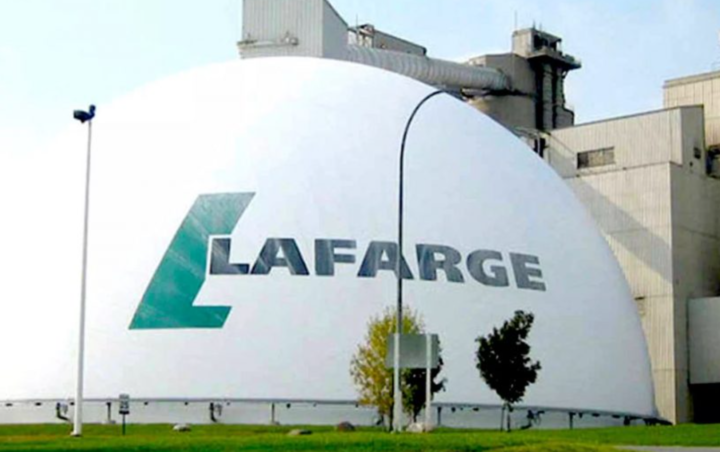Lafarge Africa Plc has reported a remarkable 70 percent increase in revenue, reaching ₦269 billion for the second quarter of 2025, underscoring its strong market performance and operational resilience despite persistent economic headwinds. The cement giant attributed the growth to robust demand, improved pricing strategies, and operational efficiency gains across its production and distribution network.
The company disclosed the figures in its unaudited financial results released to the Nigerian Exchange Group (NGX), noting that the revenue surge reflected both higher sales volumes and stronger pricing in key markets. This performance places Lafarge Africa among the cement industry leaders navigating Nigeria’s challenging macroeconomic environment, marked by inflationary pressures, currency volatility, and infrastructure bottlenecks.

Chief Executive Officer of Lafarge Africa, Lolu Alade-Akinyemi, said the results highlight the company’s ability to deliver value despite external challenges. He explained that the company’s focus on operational excellence, sustainability, and customer-centric innovations has continued to drive growth.
“We are proud to announce a 70 percent increase in revenue for Q2 2025, which is a testament to the strength of our strategy and execution. Our ability to meet rising demand, supported by strategic investments in logistics and capacity expansion, has positioned us to maintain strong growth momentum,” Alade-Akinyemi said.
He further noted that Lafarge Africa remains committed to supporting Nigeria’s infrastructure development drive while ensuring value creation for shareholders. “Our focus remains on sustainable growth, improving our environmental footprint, and delivering products that meet global standards,” he added.
The company revealed that its revenue growth was supported by rising cement consumption across Nigeria, particularly in the real estate and construction sectors, which continue to attract significant investments. With government spending on infrastructure projects ramping up, coupled with increased private sector participation in housing, demand for cement and related products has maintained an upward trajectory.
Analysts believe Lafarge Africa’s Q2 performance reflects broader trends in Nigeria’s cement industry, where leading players have reported higher revenues despite macroeconomic hurdles. The sector has remained one of the most resilient segments of the Nigerian economy, leveraging the country’s huge infrastructure and housing deficit.
However, the company’s financial statement also revealed higher operating costs, driven largely by inflation and elevated energy expenses. Nonetheless, Lafarge Africa said it had implemented several cost-optimisation strategies, including improved energy mix utilisation and supply chain efficiencies, to cushion the impact.
Industry watchers say Lafarge Africa’s revenue growth is also linked to its increasing adoption of alternative fuel sources, particularly biomass, which has helped reduce exposure to high diesel and gas costs. This aligns with its parent company Holcim Group’s global commitment to sustainable practices and decarbonisation.
Commenting on the outlook for the rest of the year, Alade-Akinyemi expressed confidence that the company would sustain its growth trajectory. He said Lafarge Africa would continue to explore innovative financing, strategic partnerships, and investments in technology to consolidate its market leadership.
“We are optimistic about the opportunities in the Nigerian market, especially with ongoing government initiatives in infrastructure and housing. We will continue to invest in efficiency, innovation, and sustainability to ensure we deliver long-term value to all stakeholders,” he noted.
Shareholders and investors have responded positively to the company’s strong Q2 results, with analysts projecting that the performance could strengthen investor confidence and support Lafarge Africa’s stock price on the NGX. Some financial experts also predict that the company’s earnings per share (EPS) for the year could outperform initial forecasts if current momentum is maintained.
Beyond financials, Lafarge Africa reiterated its commitment to environmental, social, and governance (ESG) initiatives. The company has continued to expand its corporate social responsibility programmes, focusing on education, healthcare, and community development in host communities. According to management, these initiatives are integral to the company’s long-term sustainability agenda.
As Nigeria’s cement industry continues to grow, competition among major players such as Dangote Cement, BUA Cement, and Lafarge Africa remains fierce. However, industry experts say Lafarge’s balanced approach, combining profitability with sustainability, gives it a competitive advantage in attracting both customers and investors seeking long-term value.
The Q2 performance comes at a time when the federal government is intensifying efforts to close Nigeria’s infrastructure gap, estimated by the World Bank at over $100 billion annually. Cement manufacturers are therefore expected to play a pivotal role in delivering the building blocks for national development.
Lafarge Africa’s 70 percent revenue growth to ₦269 billion is not just a reflection of rising cement demand but also of the company’s adaptability to evolving market dynamics. As it continues to leverage innovation, sustainability, and strategic partnerships, analysts say the company is well-positioned to deepen its impact on Nigeria’s economic transformation agenda.
With the rest of 2025 ahead, investors, customers, and stakeholders will be watching closely to see if Lafarge Africa can sustain this momentum in the face of persistent economic uncertainties.
Support InfoStride News' Credible Journalism: Only credible journalism can guarantee a fair, accountable and transparent society, including democracy and government. It involves a lot of efforts and money. We need your support. Click here to Donate
